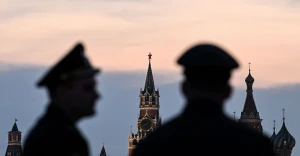
Russia expels Estonian ambassador and recalls its ambassador in Tallinn
The Russian Ministry of Foreign Affairs announces a downgrade in diplomatic relations with Estonia and leaves only a charge d'affaires in Tallinn
This was reported by the Russian Foreign Ministry.
"Estonia has now taken a new unfriendly step to radically reduce the size of the Russian Embassy in Tallinn, which confirms the line to the collapse of relations between our countries," the press service writes.
In response, Russia says it will downgrade its diplomatic representative in both countries to a charge d'affaires.
On February 23, the Russian Foreign Ministry summoned Estonian Ambassador Margus Laidre. The ambassador was informed of a "strong protest against the actions of the Estonian authorities" and ordered to leave the country.
"The Ambassador of the Republic of Estonia should leave Russia on February 7, 2023," the statement reads.
The Russian Foreign Ministry emphasized: "All responsibility for the development of this situation in relations between Russia and Estonia lies entirely with the Estonian side. We will continue to respond to the hostile steps of the Estonian leadership."
Member of the European Parliament Marina Kaljurand, who was the Estonian ambassador to Russia, said that the country should have recalled its ambassador at the beginning of the war in Ukraine.
"Expulsion of the Estonian ambassador does not mean that diplomatic relations will be severed, but it is an extreme measure. In my opinion, Estonia should have recalled its ambassador at the beginning of the war. After the aggression began, it made no sense to keep the ambassador in Moscow, where he had no access to information. Besides, the working atmosphere there probably changed a lot after February 24," Kaljurand said.
Ms. Kaljurand added that the residents of Russia will not be affected by this conflict, as the consular offices will continue to work even if there is no Estonian diplomat left in Moscow and St. Petersburg. There is no need to worry.
"In this case, our citizens will be protected by other EU missions. This practice is still in place. After all, we do not have embassies and consulates in all countries where our citizens travel. For example, in Africa, Latin America, or Asia. Estonia will simply need to reach an agreement with a specific EU state that will deal with the issues of our citizens in Moscow or St. Petersburg," Kaljurand explained. She claims it can be either one country or several. The main thing is to inform citizens about this change. "It will probably be less convenient, but the protection of our citizens has always been a priority and will remain so. So I think there is no need to worry," Kaljurand says.
- News












































